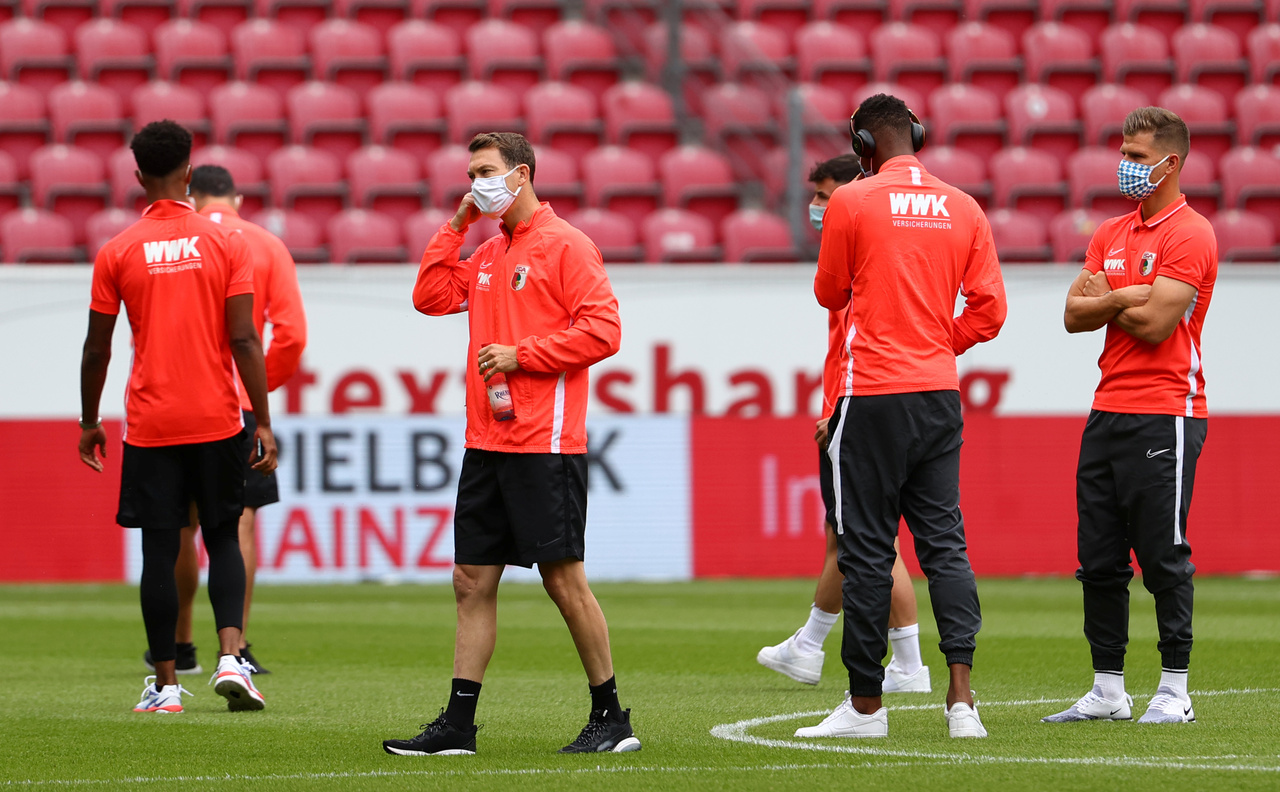As Singapore's phase 2 draws closer, question marks remain over efficacy of testing for asymptomatic athletes
Sign up now: Get the biggest sports news in your inbox

Augsburg players on a pitch before a match wearing protective face masks.
PHOTO: REUTERS
SINGAPORE - To test or not to test asymptomatic sportsmen and sportswomen? That is the question that has divided infectious diseases experts as Singapore prepares to move into phase two of the post-circuit breaker period on Friday (June 19).
While they agree that athletes in individual sports like running or swimming need not be tested for the Covid-19 virus unless symptomatic, most experts say there should be a requirement for those in team sports like basketball and football to be tested. Even then, question marks remain over the effectiveness and efficiency of such tests.
Associate Professor Alex Cook, vice-dean of research and an epidemiologist at the National University of Singapore's (NUS) Saw Swee Hock School of Public Health, noted there is a "stronger argument" for testing athletes in team sports and those indoors because of an increased risk of infection or infecting others.
"But the question is also: When do you stop testing?" he added.
"Doing a one-off sweep of athletes might pick up one or two infections but afterwards, the athletes could get infected through some other route, so unless you're repeating the tests every so often, you're not really protecting the team.
"It's not clear to me that repeat testing of athletes is good use of the tests (and it might be) better to use them in nursing homes or (for) healthcare workers where the cost-benefit ratio is better."
He noted that the tests are not cheap and that Singapore has been building up testing capacity mainly because it may be needed to control the epidemic. Each test reportedly costs about $250 and the Government covers the cost of testing for suspect cases.
In a report in The Straits Times on June 8 regarding the resumption of the local professional football league, the Singapore Premier League (SPL), Professor Paul Tambyah of the department of medicine at NUS' Yong Loo Lin School of Medicine also questioned the need for frequent testing of players.
"I personally think that players should be tested whenever symptomatic or as part of contact tracing around a player or official who is symptomatic," he said. "This could be expanded to those who have household contacts who are symptomatic."
Prof Tambyah added there that there is also the risk of false positive results in "over-testing" a low-risk population, such as the approximately 300 players and staff across the nine-team SPL.
When national sports agency Sport Singapore gave the green light for Olympics- and Paralympics-bound athletes to resume training on June 2, testing was not a requirement. But this group only comprises individual athletes in sports such as swimming, gymnastics and badminton.
Associate Professor Josip Car, director of the Centre for Population Health Sciences at Nanyang Technological University's Lee Kong Chian School of Medicine, noted that there have been models predicting how competitive team sports could affect viral transmission during normal seasons.
"While the verdict is not yet settled on such models quantitatively, the studies have addressed the need for frequent testing in competitive sporting leagues as a way to mitigate cross-team infections," he said.
Football leagues in Europe that have resumed, or are about to, have included testing as part of safety protocols in resuming play.
The German Bundesliga estimated that 25,000 tests were needed for players and club personnel from its resumption until the end of the season, which comprises nine rounds of games for each of its 18 teams.
Each individual is being tested twice a week, and only quarantined when a positive test is found. The 20-team English Premier League (EPL) has adopted a similar strategy to testing.
In the light of this, some infectious diseases experts believe routine testing of athletes in team sports is an advisable approach.
Associate Professor Hsu Li Yang, programme leader of infectious diseases and co-director of global health at the NUS Saw Swee Hock School of Public Health, said he believed it "may be prudent" to test athletes in team sports, and only for those in individual sports if they are symptomatic or have to travel for an overseas event.
Professor Teo Yik Ying, dean of the NUS Saw Swee Hock School of Public Health, had also told ST on June 8 that, while a "judicious compromise" between frequency and coverage needed to be achieved, "a frequency of once a week is a good target".
In addition to the EPL and Bundesliga, sports leagues and competitions elsewhere have also adopted frequent testing for athletes as part of plans to get going.
In the United States, the National Football League is reportedly considering testing players and staff three times a week when training camps begin in late July.
On golf's PGA Tour, meanwhile, players were tested once before play began on June 11 in the Charles Schwab Challenge in Texas, and then a second time there if they planned to travel to the next tour event, the RBC Heritage in South Carolina that begins on Saturday.


